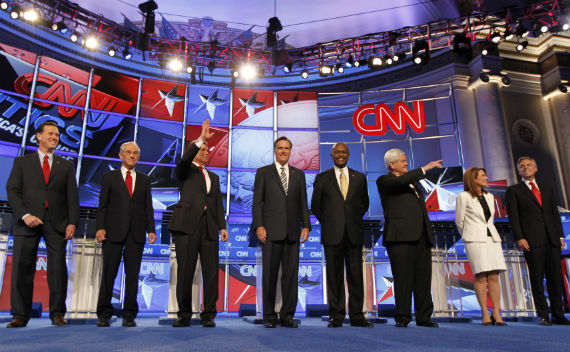Campaign 2012 Roundup: Reviewing the GOP Foreign Policy Debate
More on:

Last night’s GOP presidential debate on foreign policy provided two surprises: the conversation was unusually substantive, and some obvious and critical questions went unasked.
The ten previous debates all followed a basic rhythm: the candidates criticized President Obama while repeating as many of their standard talking points as possible. But criticism of the president last night was episodic, as were the canned talking points. The candidates instead spent their time trying to demonstrate their command of foreign policy and poking holes in what their rivals had to say. The result was that viewers got to see where the eight candidates differ on many issues and why.
The most politically charged discussion of the evening came over immigration. New GOP frontrunner Newt Gingrich flatly opposed simply deporting the eleven million illegal immigrants now living in the United States. Michele Bachmann and Mitt Romney in turn accused him of favoring “amnesty.” That’s a potentially lethal political charge with some Republican voters. The former speaker’s rivals will no doubt try to make him pay for his unorthodox position.
The bulk of the debate, however, focused on how to deal with three countries: Pakistan, Afghanistan, and Iran. Here the candidates did not break any new ground. Ron Paul repeated his belief that the United States would be best served by minding its own business overseas. Jon Huntsman called once again for reducing the U.S. footprint in Afghanistan. Rick Perry reiterated his vow not to send Pakistan “one penny, period” until it showed it was a loyal ally. Mitt Romney and Herman Cain again said they would ask the military commanders on the ground for guidance on what to do.
Most of the candidates promised to put more pressure on Iran to halt its nuclear program. Perry called for sanctioning Iran’s central bank, Gingrich endorsed a gasoline embargo on Iran, and Romney vowed to impose “crippling sanctions.” Huntsman offered a dissenting voice, saying that sanctions “are not going to work because the Chinese aren’t going to play ball and the Russians aren’t going to play ball.” No one on the stage challenged the claim, and the former Utah governor did not say what he would do instead of sanctions.
The discussion of Syria offered a bit of news. Perry repeated the call he first made on Monday for imposing a no-fly zone over the country. None of the other candidates, however, embraced the idea. Paul, Cain, and Romney all dismissed it, with the former Massachusetts governor saying that the proposal was mismatched to the threat the Assad government posed to the Syrian people.
One of the few non-Middle East questions was about whether and how the United States should help the Mexican government deal with increasingly violent drug cartels. Paul’s answer was to “cancel” the war on drugs. The other candidates avoided the question. Perry used it as an opportunity to talk about border security and to raise the specter of Hezbollah operating in Mexico. Rick Santorum and Romney also worried about Islamic extremists operating in Latin America, a threat that most regional experts dismiss as marginal or non-existent.
The debate’s main shortcoming was what wasn’t discussed. Europe’s debt problems could plunge the global economy into a depression. President Obama just returned from a week-long trip to Asia where the conversation at every stop was about how to deal with China’s rise. Egypt, the long-time pillar of U.S. policy in the Arab world, is in crisis as protestors demand that the military government cede power.
Unfortunately, viewers never learned how the candidates propose to deal with any of these critical challenges. Nor did they get insights into what the candidates would do about North Korea’s nuclear program, a mercurial Russia, or a changing climate to name just a few other core foreign policy problems.
The failure to tackle these issues, of course, can’t be blamed on the candidates. They can only answer the questions they are asked. But in not getting the opportunity to talk about the rise of China, the potential collapse of the eurozone, and the future of the Arab Spring the GOP candidates lost an opportunity to tell voters what they would do about the issues that will likely dominate the next president’s foreign policy agenda.
Perhaps they’ll get that chance at the next debate. It’s less than three weeks away.
The New York Times, Washington Post, Politico, and Slate all have their takes on the debate. Glenn Kessler and PolitiFact fact check the debate.
What did you see and hear—or not see and hear—that you thought notable?
More on:
 Online Store
Online Store
